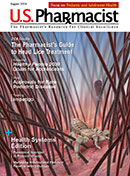In an article published on the Cleveland Clinic Health Essentials website, an ophthalmologist provided readers with key information about differentiating between ophthalmic issues related to allergies versus eye infections. Richard Gans, MD, indicates that ragweed or pet dander is a common contributing factor in ophthalmic issues related to allergies, whereas eye infections can be the result of a virus, bacterium, parasite, or fungus and vary in severity and symptoms.
Dr. Gans notes that if a person experiences anything beyond tear-like fluids coming from the eye or if there is eye pain, it is likely more than allergies. He also states that to ensure that the proper treatment is received, one should confirm the diagnosis with an ophthalmologist because if it is an eye infection, there is a risk of damaging the eye/eyesight and/or transmitting the infection to others. The symptoms commonly associated with both allergies and infections include redness, itching, burning and clear, watery discharge.
With regard to eye infections, patients may present with ocular pain, a gritty feel in the eyes, and sensitivity to light. Bacterial eye infections may have a thick discharge, while viral eye infections may have mucus-like discharge. Concerning ophthalmic allergies, topical medications are typically better than general allergy remedies. Some topical medications such as ocular antihistamines and decongestants may prevent symptoms before the allergy season begins.
The use of OTC artificial tears may also assist in keeping the eyes moistened and flush out allergens. Severe allergy symptoms may also warrant the short-term use of steroid ophthalmic medications that are available via a prescription. Conjunctivitis (pink eye), the most common eye infection, is caused by a virus or bacteria and can be easily spread to others. For viral ophthalmic infections, an ophthalmologist may recommend the use of cold compresses and OTC eye lubricants. It is important to note that viral ophthalmic infections typically resolve on their own. Bacterial infections will require the use of prescription ophthalmic antibiotics.
The author notes that it is best to obtain a rapid diagnosis and treatment when experiencing any irritation of eyes and to always seek immediate medical care if experiencing severe symptoms or symptoms not improving after self-treatment. The article recommends frequent hand washing to prevent the spread of conjunctivitis and other eye infections as well as using caution when applying eye makeup and avoiding the use of contact lenses until the ophthalmic infection is eradicated.
The content contained in this article is for informational purposes only. The content is not intended to be a substitute for professional advice. Reliance on any information provided in this article is solely at your own risk.
« Click here to return to OTC Update.






